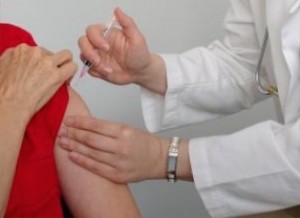The Seneca County Health Department has announced that a food service worker at Mark’s Pizzeria at 1963 Kingdom Plaza in Waterloo, New York has been diagnosed with hepatitis A. Anyone who consumed cold foods, such as salads, subs, lemons, celery sticks, and vegetables from the restaurant and who has not been previously vaccinated against the disease should seek treatment.
 A McDonalds worker was diagnosed with hepatitis A in that area two weeks ago. If you were immunized after that incident, you do not need another shot. People who are at risk for developing hepatitis A ate at Mark’s Pizzeria November 13, 2015 through November 28, 2015.
A McDonalds worker was diagnosed with hepatitis A in that area two weeks ago. If you were immunized after that incident, you do not need another shot. People who are at risk for developing hepatitis A ate at Mark’s Pizzeria November 13, 2015 through November 28, 2015.
If you ate there from November 18th through the 28th, you can get a vaccination against the illness. But if you ate there November 13, 2015 through November 17, 2015, it’s too late for a shot. Vaccinations must be given within two weeks from the date of exposure. If it’s too late for a shot, you must monitor yourself for the symptoms of hepatitis A for the next 4 to 6 weeks, and see a doctor if necessary. If you ate there on November 18, 2015, you can visit your doctor today, which is the last day for a shot, and get a hepatitis A or immune globulin vaccination.
The county is holding a clinic to provide vaccinations for those affected. Clinics will be held at the Seneca County Office Building at 1 DiPronio Drive in Waterloo, New York at the 3rd Floor Board of Supervisor’s Room. The days and hours of the clinics are Thursday, December 3, 2015 from 1:00 pm to 7:00 pm; Monday, December 7, 2015 from 3:00 pm to 7:00 pm; and Thursday, December 10, 2015 from 12:00 pm to 4:00 pm. If you ate at the restaurant on November 19 you must get the shot by tomorrow, December 3rd. If you ate there on the 20th, 21st, or 22nd, you must get the shot by Friday or Saturday, December 4th or 5th.
You should preregister and arrive during your scheduled appointment. Call the New York State Department of Health Hotline at 1-844-364-6397 or visit the Seneca County Health Department to make an appointment.
The symptoms of hepatitis A include fever, nausea, diarrhea, a light colored stool, dark colored urine, yellow eyes and skin (jaundice), tiredness, loss of appetite, and abdominal cramps. The symptoms can occur a few weeks to fifty days after exposure to the virus. The infected person is most contagious in the middle of the incubation period, before any symptoms appear, which is why these problems occur with restaurants.
The virus is passed through casual contact, through contact with items the infected person has touched, and through food and drink. That is why no one with this illness should prepare or serve food for others.
These symptoms usually last a few weeks, but some individuals can be sick up to six months. Anyone with a chronic liver disease can become seriously ill if they contract this illness. The elderly are more likely to have symptoms too, and can be more seriously ill.
While most people recover with no problems, some people can have serious complications, including inflammation and swelling of the liver. This can cause permanent damage to that organ. Every year about 100 people die from hepatitis A complications.




